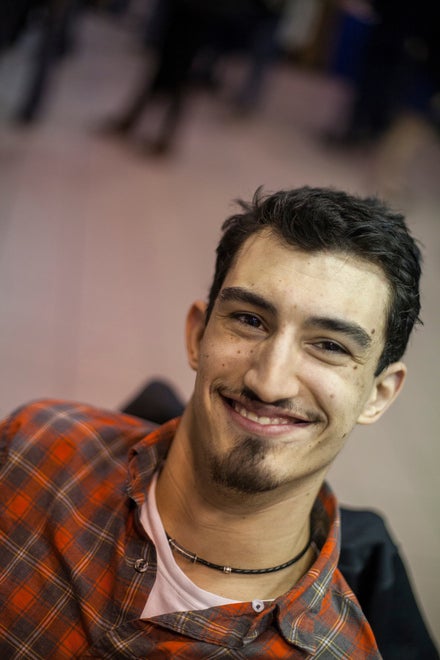KINGSTON, R.I. – April 10, 2014 – Most people type with their fingers. Andrew Pilkington types with his nose, tapping out tough-guy dialogue for his award-winning films and videos.
Born with cerebral palsy, a neurological condition that keeps him from fully controlling his fingers, arms and legs, Andrew, has excelled in persistence during his four years at the University of Rhode Island.
In May, he’ll graduate with a bachelor’s degree in film media from the Harrington School of Communication and Media, where he honed his talent as a filmmaker. He hopes to find a job in his field and eventually go to graduate school. Hollywood could be his next stop.
“There’s no other place I’d rather be than on a set,” he says. “It’s just the best feeling in the world.”
Growing up in Wayland, Mass., Andrew was drawn to make-believe as a boy arranging his playmobil figures on the floor. “My whole room was covered with these little themes,” he says. “I couldn’t really set them up so I’d ask the person with me: ‘No, no, put it there.’ ” That was his introduction to directing.
“West Wing” and other TV series fascinated him, enough that his mother, Deborah Ciolfi, took him to the Sundance Film Festival in Utah in 2006 when he was a high school freshman. There he met the most famous towhead in the world, Robert Redford, the festival’s founder. The wiry kid with the big smile was hooked.
“When I got back I started writing sitcoms and stories,” he says. “I knew this is what I wanted to do with my life. I love creating characters. You control the story. You do whatever you want.”
A two-week screenwriting course at UCLA, where he lived on campus with his mom, sealed the deal. During high school, he worked for a cable station covering town sports, wrote and produced stories about teenagers, and started his own film production company, Ruby Andromeda Productions.
By the time he arrived at URI in 2010, he was a seasoned filmmaker. His plan was to study one year and transfer to another college, but he made so many friends he decided to stay. He joined clubs; he even coached an intramural volleyball team. “I like it here,” he says. “This is a great place.”
Over the years, he has produced an impressive body of work: videos about people with disabilities; Good Friday, a feature about deception and intrigue in student government that was filmed on campus; and Suburban Kings, a flick about kids and crime that won an honorable mention for screenwriting at the Los Angeles Movie Awards in 2011. The screenplays, each about 100 pages long, took three months to write.
The Suburban banter is rough, with a heavy dose of Andrew’s dark humor. “I love making people laugh,” he says. “Even in my dramas I want jokes all the time.” The film resonates with Scorsese touches: guns, drugs, fistfights, a slew of swears, and secret meetings in cavernous warehouses. Filming took place in Andrew’s hometown, once near a baseball field. The humor of shooting bad-guy scenes near wholesome ballplayers was not lost on him. “We were off to a good start,” he says, with a chuckle.
Technological advances have enabled Andrew to make movies, and he’s grateful for that. He edits by pressing his right foot, mostly his toes, on a joystick on the floor, and he writes by gently tapping computer keys with his nose. He is a swift and decisive typist who rarely uses the delete key. “I can bang out five pages in 20 minutes,” he says. A camera crew does his filming as he directs, with glee and confidence, from a wheelchair.
“What’s great about this simple technology is it gives people with disabilities an opportunity to compete in today’s work force and completely assimilate into today’s society,” he says. “It really breaks down that wall. They have productive lives to contribute to society. I’m very thankful for that.”
Robert Leuci, a URI English professor who has taught Andrew for the last three years, says he’s a gifted writer and “one of the most inspirational people I’ve ever met.” Self-pity is not in the 22-year-old’s lexicon.
“I’ve never heard him say anything bad about anyone,” Leuci says. “He handles his life with such aplomb, with such dignity. He’s sensitive and incredibly gentle. He’s just an amazing human being. He can do any job. Really, anything.”
During his years at URI, Andrew has lived independently in a residence hall with the help of aides, who come in the morning and afternoon to help him eat and dress. The rest of the time he’s on his own.
“When I go to class I’m alone, and I do my own school work,” he says. “I go so fast. I get to where I need to go. I don’t want to wait about and waste time.”
He also doesn’t waste time dwelling on fate. He has never let his condition get in the way of leading the good life – in and out of the editing room. “I always tell people that you can’t expect the world to adapt to you,” he says. “You have to adapt to the world.”
Photo above: Andrew Pilkington, 22, of Wayland, Mass., a senior at the University of Rhode Island who is majoring in film media and is looking for a job in his field, possibly making promotional videos. “My disability does not limit my ability to perform in the work place,” he says. “I can accomplish any task on a computer and I can travel anywhere that requires me to be there. When I get a deadline, I complete a task with the same efficiency as anyone else, if not better. I’m not afraid to put the extra work in when something is not to my satisfaction.”

